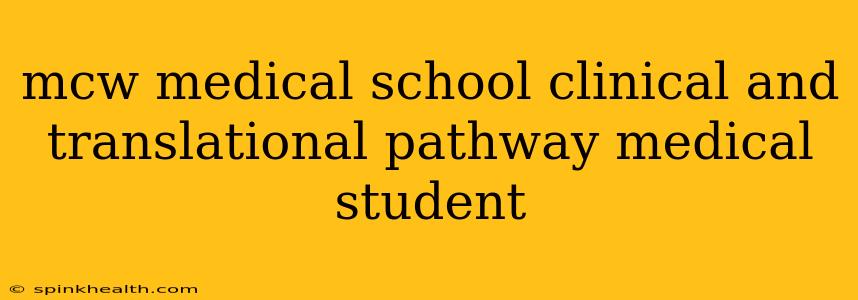Navigating the MCW Medical School Clinical and Translational Pathway: A Student's Journey
The Medical College of Wisconsin (MCW) offers a unique Clinical and Translational Pathway for its medical students, a program designed to blend rigorous medical training with hands-on research experience. This isn't just another medical school; it's a journey into the heart of discovery, where the classroom seamlessly merges with the lab, and theoretical knowledge translates into tangible impact on patient care. Let's delve into what makes this pathway so special and answer some key questions prospective students often ask.
What exactly is the MCW Clinical and Translational Pathway?
Imagine a medical education that doesn't just equip you with the knowledge to treat patients today, but also empowers you to shape the future of medicine tomorrow. That's the essence of the MCW Clinical and Translational Pathway. This program immerses students in research early on, fostering a deep understanding of the scientific basis of disease and the development of innovative treatments. It's not about adding research as an afterthought; it's about integrating it into the very fabric of your medical training. You'll work alongside leading researchers, contributing to cutting-edge projects, and gaining invaluable experience in designing, conducting, and analyzing research studies.
How does research integrate with clinical rotations?
This isn't a case of compartmentalized learning. The pathway meticulously weaves together clinical experiences and research endeavors. You'll participate in structured research projects throughout your medical school years, often connecting your research interests to your clinical rotations. For instance, a student researching a novel cancer therapy might find themselves applying that knowledge during an oncology rotation, fostering a deeper understanding of both the scientific rationale and the practical implications of the treatment. This interconnectedness provides a unique perspective, enriching both your clinical skills and your research acumen.
What kind of research opportunities are available?
MCW boasts a vibrant research ecosystem with a wide array of opportunities across numerous disciplines. Whether your passion lies in basic science, translational research, or clinical trials, you'll find a niche that aligns with your interests. The faculty mentors are renowned experts in their fields, providing guidance and support throughout your research journey. The program offers diverse projects, from investigating the molecular mechanisms of disease to developing novel diagnostic tools and therapies.
What are the benefits of completing the Clinical and Translational Pathway?
The advantages extend far beyond just adding "research experience" to your CV. This pathway cultivates a critical mindset, enhancing your ability to analyze complex medical problems, evaluate evidence, and make informed decisions. It provides a strong foundation for future career paths, whether you aspire to become a clinician-scientist, pursue a research-intensive residency, or contribute to advancements in medical technology. Moreover, the networking opportunities are unparalleled, connecting you with leading researchers and clinicians who become invaluable mentors and collaborators.
What are the admission requirements for this pathway?
While the specific requirements may vary, expect a highly competitive application process. A strong academic record, compelling MCAT scores, and a demonstrated interest in research are paramount. Highlighting relevant research experience, even if from undergraduate studies, is crucial in demonstrating your commitment to the pathway. A well-crafted personal statement showcasing your passion for both clinical medicine and research is equally vital. Directly addressing your interest in this specific pathway within your application will show your genuine enthusiasm.
Are there specific research areas I can focus on?
The scope is remarkably broad. MCW's research prowess spans various fields, including cancer biology, neuroscience, cardiovascular disease, infectious diseases, and more. The pathway encourages students to explore their interests and identify mentors whose research aligns with their aspirations. This flexibility allows you to tailor your research experience to your specific career goals.
How does the pathway prepare me for residency applications?
The research experience gained significantly strengthens residency applications. It demonstrates intellectual curiosity, critical thinking abilities, and a dedication to lifelong learning. The publications and presentations resulting from your research further bolster your credentials, making you a highly competitive applicant for prestigious residency programs. The skills you develop – data analysis, critical appraisal of literature, presentation of findings – are all highly transferable and valued in the medical field.
Embarking on the MCW Clinical and Translational Pathway is more than just choosing a medical school; it's choosing a path towards a fulfilling and impactful career in medicine. It's a journey of discovery, innovation, and ultimately, a significant contribution to advancing healthcare.

